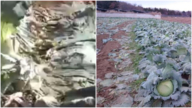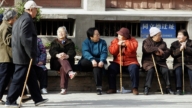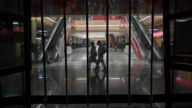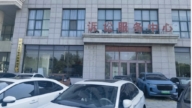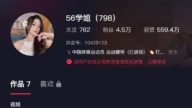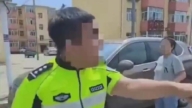【新唐人2013年11月08日讯】最近,发生在天安门和山西的爆炸案,引起了中国社会的广泛关注。外界认为,中国民众对中共当局完全失去信心,抗议中共暴政的举动,从个人的肢体冲突转向冲击党政首脑机关,从个人泄愤上升到政治宣示,从刑事案件上升到政治抗议。专家指出,这种抗暴趋势还会继续升级, 不会因为三中全会结束而终止。
天安门撞车爆炸案余音未了,11月6号,中共山西省委附近又发生系列连环爆炸,爆炸现场散落地上的滚珠和钉子,被认定是自制炸弹爆炸。
据了解,嫌犯大约是在早晨7点左右将炸弹安放完毕,乘坐一辆黑色桑塔纳离去。炸弹藏于省委大楼前面的绿化带的花丛中,共有9枚炸弹,其中8枚炸弹被引爆。
美国纽约民主大学校长唐柏桥:“中国民众实际上是非常温和的,原来上访啊,后面和平示威啊, 然后升级到有意识的了武装反抗,这是目前的趋势,而且今后这种趋势越来越严重,当局还不醒悟的话,这场革命将是暴风骤雨式的,可能会有很多流血。”
时事评论员林子旭:“这么多年来善良的中国民众一直对中共政府抱有幻想,但是残酷的现实让很多中国人彻底陷入了绝望。北京爆炸声响起来,那种冲击波会震撼所有被中共压迫的民众,山西省委的爆炸事件,很有可能就是有人在模仿北京爆炸案的做法。”
中国近年来在公共场所发生的爆炸、纵火、袭击等事件接连不断。据统计,自2008年北京青年杨佳袭击上海公安局,造成警方伤亡后,五年来,针对官方的暴力报复事件发生了近百宗。
2011年5月26号上午,江西省抚州市市内的三处政府办公地,几乎同时遭到炸弹爆炸袭击。
今年6月,一名男子纵火烧毁厦门一辆公交车,导致包括本人在内47人死亡。 7月,因司法不公造成残疾的山东籍男子冀中星,坐轮椅在北京首都机场引爆炸药。
一周前,一辆吉普车冲撞北京天安门,同时制造爆炸事件。
而在天安门爆炸案,和机场爆炸案中,引爆的人,都呼喊大家闪开。
唐柏桥:“所以这些事情都有一个共同的特点,他们并不想伤害无辜,而且他们的矛头是直接指向当局的,所以我觉得这是变相的革命,或者叫一个人的革命,或者叫一个人的起义,只要中共政权现在的镇压政策不变,这种势头会越来越猛。”
山西爆炸案发生后,中共宣传部要求各媒体低调报导,第二天,山西太原出版的各个报纸头版一片“和谐”,没有提到山西太原爆炸案,而当天《央视》“新闻联播”也“漏报”此事。
唐柏桥:“中共能够维持到今天,他们非常狡猾,有时候想给民众栽赃,像天安门自焚案,它给法轮功泼污水,但现在形势变了,你怎去批评他,怎么去攻击人家,反正老百姓把他当成英雄,所以在这种情况下,就要低调报导。”
山西省委连环爆炸案后,太原汽车总站发出通知说,11月7号起,太原长途汽车站到北京的旅客购票实行实名制。
林子旭:“面对这一切,中共一定会利用更暴力的手段来镇压民众,这样民众的反弹也必然会更加强烈,今天的中共危机重重,民众的抗争如果再坚决猛烈一些,估计中共就要撑不住了。”
中国“上海大学”研究中国社会意识问题的教授朱学勤认为,这些爆炸、袭击单个看来是孤立的刑事事件,但把它们放在一起看,会看到一个令当局非常不安的趋势,事件已经发生了质的转变,性质从个人泄愤上升到政治宣示,从刑事案件上升到政治抗议。袭击者自杀还是造成他人伤亡的数字本身反而已经不重要了。
网友提醒大家,社会开始乱了!中共政权已经开启恐怖模式,政府部门和人群密集地段都是高危区域,到政府部门办事要戴上头盔。
采访编辑/刘惠 后制/钟元
Tiananmen Square and Shanxi Bombings Reflect New Public Protest Trends
The recent car bomb attack in Tiananmen
Square, and subsequent bombing in Shanxi
have caused widespread concern in China.
International observers believe that the Chinese
people are fully losing confidence in the authorities.
In protests against the regime, there has
been a shift from physical protest and
conflict, to targeting of government buildings.
There is a move away from venting personal
anger, and towards political declarations,
and from criminal cases to political protest.
The experts pointed out that the uprising trend of against the
tyranny will not be end with the Third Plenary Session terminates.
On November 6, a series of explosions took place near
the provincial government building in Shanxi Province.
This was while the shadow of the
Tiananmen bombing still lingered.
Ball-bearings and nails were scattered at
the explosion site from a homemade bomb.
It is reported that the suspect set the bomb at
7am in the morning, and left in a black Santana.
There were bombs hidden in the vegetation in front
of the Provincial Building, and eight were detonated.
Tang Baiqiao, President, New York University
Democracy Academy of China:"The
Chinese people are actually very gentle.
The current trend is shifting from petitioning and
peaceful demonstrations into the armed resistance.
If the authorities do not wake up, there will be a mighty
storm, and bloodshed in increasingly serious revolution."
Lin Zixu, political commentator: “The kind Chinese people
have been living under an illusion with the Chinese regime.
Harsh reality has brought them to complete despair.
The impact from the Beijing explosion
has shocked all oppressed people.
The Shanxi Provincial bombing
resembles a copycat bombing."
There have been more and more explosions, arson and
assaults happening throughout China during recent years.
According to statistics, there are hundreds of violent
uprisings against the regime in the past 5 years.
These occurred after Yang Jia assaulted members
of the Shanghai Public Security Bureau in 2008.
Three government offices were simultaneously
attacked by a bomb in Fuzhou, Jiangxi Province in 2011.
This June, a man set fire to a bus in Xiamen,
resulting in 47 deaths, including himself.
In July, Ji Zhongxing, detonated dynamite
in his wheelchair at Beijing Capital Airport.
A week ago, a jeep crashed in Beijing
in Tiananmen Square, and exploded.
The people who Bombings detonated in Tiananmen Square
and airport all called out to clear.
Tang Baiqiao: “A common feature in these incidents
is the target of attack, which are directed toward
the authorities, and not towards innocent people.
This is a disguised revolution, or personal
revolution, or a form of personal uprising.
This kind of revolution will become increasingly fierce, as
long as the Chinese regime’s repression remains unchanged."
The Propaganda Department directive on the Shanxi
bombing was to only allow low-profile coverage.
The day after the incident, front pages of
all Taiyuan newspapers were “harmonious",
with no report on the Taiyuan bombing report.
China Central Television also failed to report on the bombing.
Tang Baiqiao: “The Chinese authorities are
very cunning, in order to maintain their rule.
It is commonplace for the regime to shift
responsibility towards others that they want to target.
In the Tiananmen Square self-immolation, it
shifted the responsibility onto Falun Gong, where
in fact it was the regime’s propaganda stunt.
Now people regard Falun Gong as the hero,
no matter how the authorities attack them.
In this case, they have to report in low key."
After the Shanxi bombings, staff at the Taiyuan Bus
station noticed that real names needed to be provided
when purchasing a ticket from Taiyuan to Beijing.
Lin Zixu: “In this case, the Chinese regime will use more
violent means to suppress, with more strong rebounds.
If public protests are more resolute and violent, the Chinese
authorities will not be able to hold the system together."
Professor Zhu Xueqin from Shanghai University comments
that these explosions, and attacks appear to be isolated.
When we put them all together, they may create
a very disturbing trend for the authorities.
There is a qualitative shift from individuals venting anger to
political declarations; from criminal cases to political protests.
It is not just about the numbers of people hurt in the incidents.
Netizens comment that Chinese society is deteriorating.
The Chinese Communist regime
is now in anti-terrorist mode.
Government departments and
crowded places are high-risk areas.
People need to wear a helmet to
go to the government departments.


